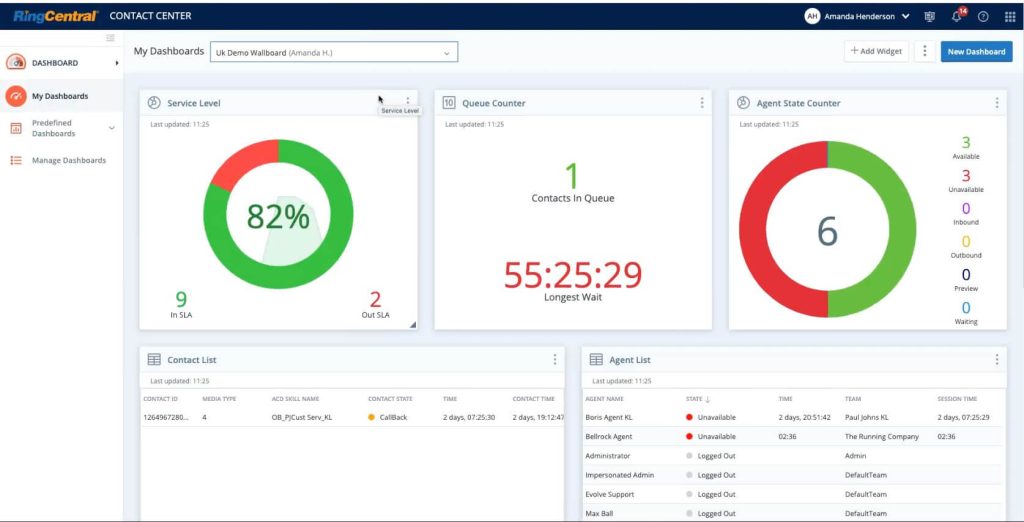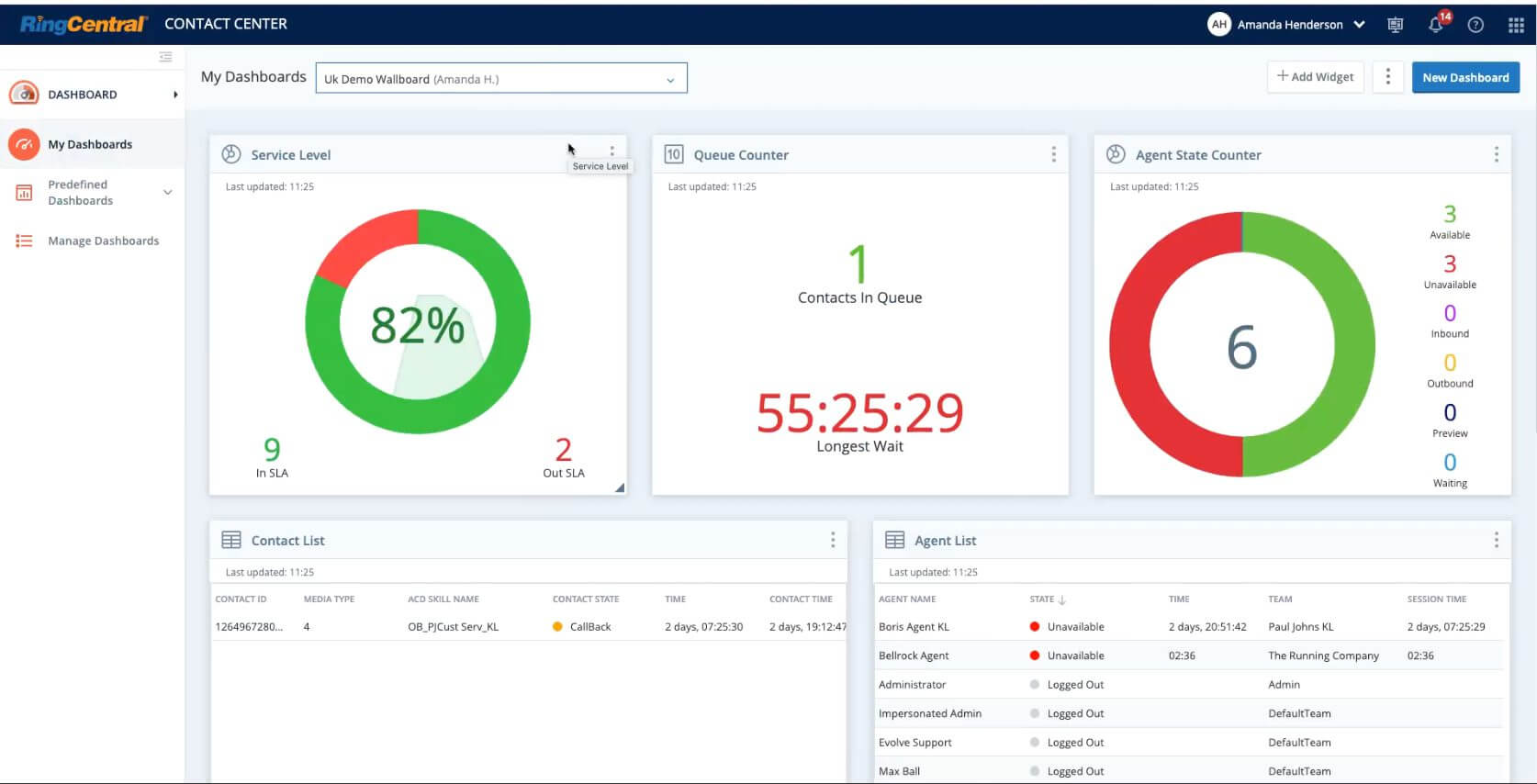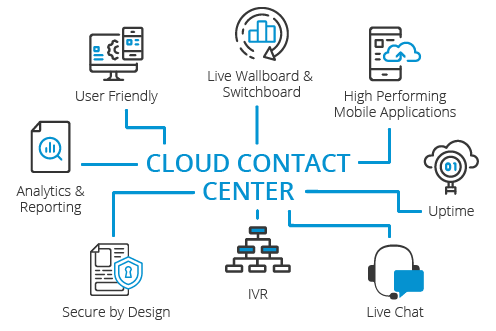What is the best cloud based call center software for a customer service?

In today’s fast-paced business environment, delivering exceptional customer service is crucial for maintaining customer satisfaction and loyalty. Cloud-based call center software has emerged as a powerful tool to streamline communication, enhance efficiency, and provide seamless support. With a wide range of options available, choosing the best cloud-based call center software for customer service can be challenging. Factors such as scalability, integration capabilities, advanced features, and cost-effectiveness play a significant role in determining the ideal solution. This article explores the top cloud-based call center platforms, highlighting their unique strengths to help businesses make an informed decision and elevate their customer service experience.
- What is the Best Cloud-Based Call Center Software for Customer Service?
-
What is the best software for call centers?
- What Features Should the Best Call Center Software Have?
- How Does Cloud-Based Call Center Software Compare to On-Premise Solutions?
- What Are the Benefits of Using AI in Call Center Software?
- How Important is CRM Integration in Call Center Software?
- What Are the Security Considerations for Call Center Software?
- What is cloud-based contact center software?
- What CRM do call centers use?
- What is the largest call center software company?
-
Frequently Asked Questions (FAQ)
- What features should I look for in the best cloud-based call center software for customer service?
- How does cloud-based call center software improve customer service?
- What are the benefits of using cloud-based call center software over traditional systems?
- Which cloud-based call center software is best for small businesses?
What is the Best Cloud-Based Call Center Software for Customer Service?
When it comes to selecting the best cloud-based call center software for customer service, businesses need to consider several factors such as scalability, integration capabilities, ease of use, and cost-effectiveness. The right software can significantly enhance customer satisfaction, streamline agent productivity, and provide valuable analytics to improve service quality. Below, we explore the key aspects to help you identify the best solution for your needs.
Key Features to Look for in Cloud-Based Call Center Software
The best cloud-based call center software should offer a comprehensive set of features tailored to customer service needs. These include omnichannel support, automatic call distribution (ACD), interactive voice response (IVR), real-time analytics, and CRM integration. Additionally, AI-powered tools like chatbots and sentiment analysis can further enhance the customer experience.
Top Cloud-Based Call Center Software Solutions
Several cloud-based call center software solutions stand out in the market. Some of the most popular options include Five9, Talkdesk, Genesys Cloud, Zendesk Talk, and RingCentral Contact Center. Each of these platforms offers unique strengths, such as scalability, customization, and advanced analytics, making them suitable for businesses of different sizes and industries.
Benefits of Using Cloud-Based Call Center Software
Switching to cloud-based call center software offers numerous benefits. It eliminates the need for on-premise hardware, reduces maintenance costs, and provides flexibility for remote work. Moreover, it enables real-time updates, seamless scalability, and enhanced security through regular updates and compliance with industry standards.
How to Choose the Right Cloud-Based Call Center Software
Choosing the right cloud-based call center software depends on your business requirements. Start by assessing your call volume, team size, and budget. Evaluate the software's integration capabilities with your existing tools, such as CRM systems and helpdesk software. Additionally, consider the ease of use and the availability of customer support during implementation and beyond.
Cost Comparison of Popular Cloud-Based Call Center Software
The cost of cloud-based call center software varies depending on the features and the number of users. Below is a comparison table of some popular options:
| Software | Starting Price | Key Features |
|---|---|---|
| Five9 | $100/user/month | Omnichannel support, ACD, IVR, AI tools |
| Talkdesk | $75/user/month | Real-time analytics, CRM integration, customizable dashboards |
| Genesys Cloud | $75/user/month | Scalability, AI-powered routing, workforce management |
| Zendesk Talk | $49/user/month | Seamless CRM integration, call recording, voicemail |
| RingCentral Contact Center | $50/user/month | Omnichannel support, analytics, AI-driven insights |
What is the best software for call centers?

What Features Should the Best Call Center Software Have?
The best call center software should include a variety of features to enhance efficiency and customer satisfaction. Key features to look for include:
- Automatic Call Distribution (ACD): Ensures calls are routed to the most appropriate agent based on predefined criteria.
- Interactive Voice Response (IVR): Allows customers to interact with a menu system to resolve issues without agent intervention.
- Call Recording: Enables quality assurance and training by recording calls for later review.
- Real-Time Analytics: Provides insights into call center performance and agent productivity.
- CRM Integration: Seamlessly integrates with customer relationship management systems to provide agents with customer information.
How Does Cloud-Based Call Center Software Compare to On-Premise Solutions?
Cloud-based call center software offers several advantages over traditional on-premise solutions:
- Scalability: Easily scales up or down based on call volume and business needs.
- Cost-Effectiveness: Reduces upfront costs and ongoing maintenance expenses.
- Remote Accessibility: Allows agents to work from anywhere with an internet connection.
- Automatic Updates: Ensures the software is always up-to-date with the latest features and security patches.
- Disaster Recovery: Provides robust backup and recovery options to ensure business continuity.
What Are the Benefits of Using AI in Call Center Software?
Artificial Intelligence (AI) can significantly enhance call center operations:
- Chatbots: Handle routine inquiries, freeing up agents for more complex tasks.
- Sentiment Analysis: Analyzes customer emotions to provide better service.
- Predictive Analytics: Forecasts call volumes and customer behavior to optimize staffing.
- Voice Recognition: Improves IVR systems by understanding natural language.
- Personalization: Tailors interactions based on customer data and history.
How Important is CRM Integration in Call Center Software?
CRM integration is crucial for providing a seamless customer experience:
- Unified Customer View: Provides agents with a complete history of customer interactions.
- Efficient Issue Resolution: Reduces call handling time by giving agents immediate access to relevant information.
- Enhanced Customer Service: Allows for personalized interactions based on customer data.
- Data Accuracy: Ensures that customer information is consistent across all platforms.
- Improved Reporting: Offers detailed insights into customer behavior and agent performance.
What Are the Security Considerations for Call Center Software?
Security is a top priority for call center software to protect sensitive customer data:
- Data Encryption: Ensures that all data transmitted is secure and unreadable to unauthorized parties.
- Access Controls: Restricts access to sensitive information based on user roles.
- Compliance: Adheres to industry standards and regulations such as GDPR and PCI-DSS.
- Regular Audits: Conducts frequent security audits to identify and mitigate vulnerabilities.
- Incident Response: Provides a clear plan for responding to security breaches and data leaks.
What is cloud-based contact center software?

What is Cloud-Based Contact Center Software?
Cloud-based contact center software is a customer service solution hosted on remote servers and accessed via the internet. Unlike traditional on-premise systems, it eliminates the need for physical hardware and allows businesses to manage customer interactions, such as calls, emails, chats, and social media, from anywhere. This software is highly scalable, cost-effective, and offers advanced features like omnichannel communication, AI-driven analytics, and real-time reporting.
Key Features of Cloud-Based Contact Center Software
Cloud-based contact center software comes with a variety of features designed to enhance customer service and streamline operations. Some of the most notable features include:
- Omnichannel Support: Enables seamless communication across multiple channels like phone, email, chat, and social media.
- AI and Automation: Utilizes AI for tasks like chatbots, sentiment analysis, and predictive routing.
- Real-Time Analytics: Provides instant insights into agent performance and customer satisfaction.
- Scalability: Allows businesses to easily add or reduce agents based on demand.
- Integration Capabilities: Integrates with CRM systems, helpdesk software, and other business tools.
Benefits of Using Cloud-Based Contact Center Software
Adopting cloud-based contact center software offers numerous advantages for businesses of all sizes. These benefits include:
- Cost Efficiency: Reduces upfront costs by eliminating the need for expensive hardware and maintenance.
- Flexibility: Enables remote work and access from any location with an internet connection.
- Improved Customer Experience: Delivers faster response times and personalized interactions.
- Enhanced Security: Provides robust data protection and compliance with industry standards.
- Quick Deployment: Can be set up and operational in a matter of days or weeks.
How Cloud-Based Contact Center Software Works
Cloud-based contact center software operates through a combination of cloud infrastructure, APIs, and third-party integrations. Here’s how it works:
- Data Storage: All customer and interaction data is stored securely in the cloud.
- Routing: Incoming queries are automatically routed to the most suitable agent or department.
- Communication: Agents use web-based interfaces to handle calls, chats, and emails.
- Analytics: Real-time dashboards provide insights into performance metrics and customer behavior.
- Updates: The software is regularly updated by the provider, ensuring access to the latest features.
Choosing the Right Cloud-Based Contact Center Software
Selecting the best cloud-based contact center software requires careful consideration of several factors. Key aspects to evaluate include:
- Business Needs: Identify the specific requirements of your customer service operations.
- Scalability: Ensure the software can grow with your business.
- Integration: Check compatibility with existing tools like CRM and ERP systems.
- Security: Verify that the software meets industry security standards.
- Vendor Reputation: Research the provider’s track record and customer reviews.
What CRM do call centers use?

Call centers typically use Customer Relationship Management (CRM) systems to manage interactions with customers, streamline workflows, and improve overall efficiency. Some of the most popular CRM platforms used by call centers include Salesforce, HubSpot, Zendesk, Zoho CRM, and Microsoft Dynamics 365. These platforms are chosen for their ability to integrate with call center software, provide real-time analytics, and enhance customer service through personalized interactions.
Why do call centers rely on CRM systems?
Call centers rely on CRM systems because they centralize customer data, improve communication, and enhance productivity. Here are the key reasons:
- Centralized Data: CRMs store all customer information in one place, making it easier for agents to access and update records.
- Improved Communication: CRMs enable seamless communication between teams, ensuring consistent customer service.
- Enhanced Productivity: Automation features in CRMs reduce manual tasks, allowing agents to focus on resolving customer issues.
What features should a CRM for call centers have?
A CRM for call centers should have specific features to meet the unique demands of the industry. These include:
- Call Tracking: The ability to log and track calls for better follow-up and analysis.
- Integration with Call Center Software: Seamless integration with tools like VoIP and IVR systems.
- Real-Time Analytics: Dashboards that provide insights into call metrics, agent performance, and customer satisfaction.
How does Salesforce benefit call centers?
Salesforce is a leading CRM platform that offers numerous benefits to call centers:
- Customizable Dashboards: Agents can create personalized views to monitor key metrics.
- Omnichannel Support: Salesforce allows call centers to manage interactions across email, chat, phone, and social media.
- AI-Powered Insights: Tools like Einstein Analytics provide predictive insights to improve customer service.
What makes Zendesk a popular CRM for call centers?
Zendesk is widely used in call centers due to its user-friendly interface and robust features:
- Ticketing System: Efficiently manages customer inquiries and escalations.
- Self-Service Options: Provides customers with knowledge bases and FAQs to resolve issues independently.
- Multi-Channel Support: Integrates phone, email, chat, and social media into a single platform.
How does Zoho CRM support call center operations?
Zoho CRM is another popular choice for call centers, offering features tailored to their needs:
- Automation: Automates repetitive tasks like call logging and follow-ups.
- AI Assistant (Zia): Provides predictive sales analytics and customer insights.
- Customization: Allows call centers to tailor the CRM to their specific workflows and requirements.
What is the largest call center software company?

The largest call center software company is Genesys, a global leader in customer experience and contact center solutions. Genesys provides a comprehensive suite of tools for managing customer interactions across multiple channels, including voice, email, chat, and social media. Their platform is widely used by businesses of all sizes to enhance customer service and streamline operations.
What Makes Genesys the Largest Call Center Software Company?
Genesys has established itself as the largest call center software company due to its innovative technology, scalable solutions, and global reach. Here are some key factors:
- Comprehensive Features: Genesys offers a wide range of features, including omnichannel routing, workforce management, and AI-driven analytics.
- Global Presence: With offices in over 50 countries, Genesys serves a diverse clientele, including Fortune 500 companies.
- Cloud-Based Solutions: Their cloud platform, Genesys Cloud, is highly scalable and supports businesses of all sizes.
Key Features of Genesys Call Center Software
Genesys provides a robust set of features designed to enhance customer interactions and improve operational efficiency. These include:
- Omnichannel Support: Seamlessly integrates voice, email, chat, and social media for a unified customer experience.
- AI and Automation: Utilizes AI to predict customer needs and automate routine tasks, improving agent productivity.
- Real-Time Analytics: Offers real-time insights into customer interactions, helping businesses make data-driven decisions.
Industries That Benefit from Genesys Solutions
Genesys serves a wide range of industries, including:
- Retail: Enhances customer service and supports e-commerce operations.
- Healthcare: Improves patient communication and streamlines appointment scheduling.
- Financial Services: Ensures secure and efficient customer interactions for banking and insurance companies.
Advantages of Using Genesys Call Center Software
Businesses choose Genesys for several compelling reasons:
- Scalability: Easily scales to accommodate growing business needs.
- Flexibility: Supports both on-premise and cloud-based deployments.
- Customer Satisfaction: Enhances customer experience through personalized and efficient service.
How Genesys Compares to Other Call Center Software Providers
Genesys stands out from competitors due to its:
- Advanced Technology: Incorporates cutting-edge AI and machine learning capabilities.
- Global Support: Provides 24/7 support and services worldwide.
- Proven Track Record: Trusted by leading brands across various industries.
Frequently Asked Questions (FAQ)
What features should I look for in the best cloud-based call center software for customer service?
When selecting the best cloud-based call center software for customer service, it's essential to prioritize features that enhance efficiency and customer satisfaction. Look for omnichannel support, which allows agents to handle interactions across multiple platforms like phone, email, chat, and social media seamlessly. Automation tools, such as IVR (Interactive Voice Response) and AI-driven chatbots, can streamline workflows and reduce wait times. Additionally, real-time analytics and reporting capabilities are crucial for monitoring performance and making data-driven decisions. Lastly, ensure the software offers scalability to grow with your business and robust security measures to protect sensitive customer data.
How does cloud-based call center software improve customer service?
Cloud-based call center software significantly enhances customer service by providing flexibility and accessibility. Agents can work from anywhere with an internet connection, ensuring uninterrupted service even during disruptions. The software also enables faster response times through features like call routing and automated responses. Moreover, integration with CRM systems allows agents to access customer history and preferences, enabling personalized interactions. By leveraging real-time data, businesses can identify trends, resolve issues proactively, and deliver a more consistent and satisfying customer experience.
What are the benefits of using cloud-based call center software over traditional systems?
Cloud-based call center software offers several advantages over traditional on-premise systems. First, it eliminates the need for expensive hardware and maintenance, reducing operational costs. It also provides greater scalability, allowing businesses to add or remove users and features as needed. Additionally, cloud-based systems are easier to update, ensuring access to the latest features and security patches. The ability to integrate with other tools and platforms enhances workflow efficiency, while remote accessibility supports a distributed workforce. Overall, cloud-based solutions are more adaptable to the evolving needs of modern customer service operations.
Which cloud-based call center software is best for small businesses?
For small businesses, the best cloud-based call center software should balance affordability, ease of use, and essential features. Solutions like Zendesk Talk, Freshdesk, and RingCentral are popular choices due to their user-friendly interfaces and scalable pricing plans. These platforms offer basic call management, omnichannel support, and integration with other business tools, making them ideal for startups and small teams. Additionally, they provide analytics and reporting to help small businesses track performance and improve customer service. When choosing, consider your specific needs, such as the number of agents, expected call volume, and desired features, to find the most suitable option.
Deja una respuesta

Entradas Relacionadas